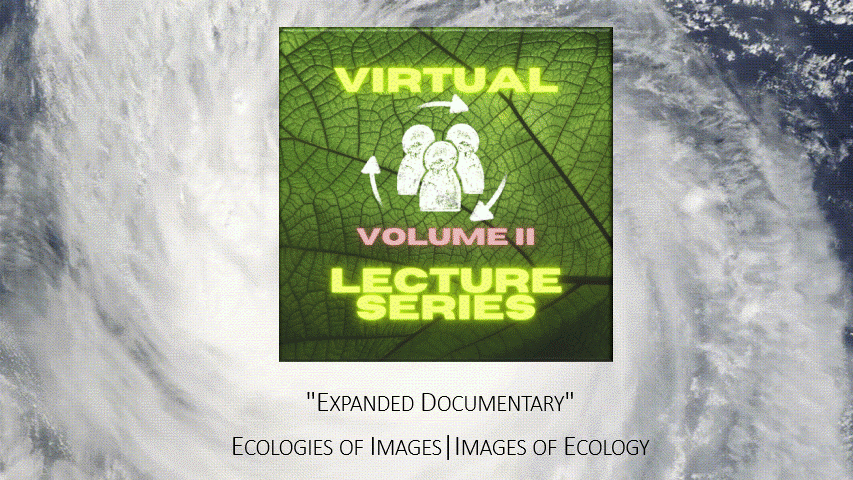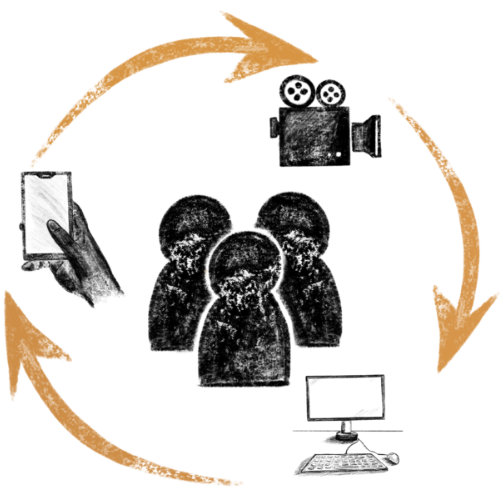BMBF-Project DiD – Digital Documentary Practices – Das Dokumentarische im Digitalen
Hosted by Bayreuth University, Digital Media and Applied Media Studies
PD Dr. Anna Wiehl

Currently, we are facing various global crises: cataclysmic geopolitical distortions are shattering what we used to call our ‚world order‘, economic crises are breaking into our lives, the endangerments of Democracy and Human Rights are omnipresent. Yet, with all these visually very present crises and their immediate impact on our daily lives, we are running the risk of pushing one concern of our time which should have upmost priority into the background. Without dramatizing the issue, one can state that we are living in times of ecological emergency: climate crisis, the loss of biodiversity, global warming, the sea level rise, deforestation, exploitation of natural resources, and extreme weather events, … and though they might seem to primarily affect our natural environment, they also entail political radicalization, a widening divide between South and North, East and West, the challenges of the digitalization, migration, systemic injustice, critical monopolization and economic dependencies. In short: the intricate entanglements which are at play deeply impact our whole existence.
These various crises and their different manifestations are accompanied by a crisis of representation: controversy and a general atmosphere of fear and uncertainty are on the rise, documentary’s truth claim is further up to debate, and given the complex interdependencies of matters and concerns, media practices need to be reconceptualized – in theory as well as in practice.
This lecture series sets out to fathom the potential of the currently expanding field of documentary theory and practices. Tackling some of the essential issues at the intersection or rather junction of ‚media + ecology‘, ‚mediatization + environment‘, we will think through possibilities of how emerging – often experimental – practices could contribute to ways out of dead-ends in mediatization in times of cataclysm. Revisiting different dimensions of ‚ecologies of images‘ and ‚images of ecology‘ (cf. Ross 1996), we critically engage with both concepts and conceptualizations of key-clusters in this complex imbroglio. Being aware that ‚media‘ and ‚mediatization‘, ‚the documentary‘ and especially doing documentary on the one hand and environment and ‚the ecological‘ on the other hand need to be distinguished in many ways, we are nonetheless suggesting that they are deeply intermingled and mutually affect each other (cf. Chang et al. 2019, p. 3).
One of the major premises hereby is the fact that ‚the documentary‘ cannot not be reduced to being an epistemic genre; rather, it is imbued with a transformative impetus and an innate awareness of issues going alongside with politics (and poetics) of representation – and this applies even more so to documentary practices in the digital realm. Hence, we are starting from the premises that the expanding field of documentary is not formed by objects and artifacts but that it is inhabited by lively processes of mediatization/mediation (cf. Zylinska 2014; Couldry, 2008)).
Thus, we dive deep into ‚mesh-works‘ (cf. Ingold 2022) of networked media ecologies; we retrace documentary’s tradition, explore documentary’s diversifying present and envision documentary’s future; we rethink notions of virtuality and actuality, interactivity, interaction and participation; we probe into the potential of polyphony and multi-perspectivity; we are interested in the ‚more-than-…‘: the ‚more-than-human‘ as well as ‚the-more-than-representational‘; we try to figure out how interactive documentary practices ‚rewire the environment‘ (Chang et al. 2019, pp. 3–4) with its multifaceted notions – ranging from natural to infrastructural environments, from social and psychic environments – always questioning the implications these practices can have; we de- and re-construct the often all too vague metaphorical notions of ‚ecology‘ in the field of media studies to apply the complex cluster with its various associations afresh in concrete ecologically oriented contexts of current environmental crises. Or in short: we wander in the transdisciplinary landscape which opens when eco-criticism, the environmental humanities and documentary theory (and practices) meet.
Invited guests are amongst others Elizabeth Miller (Concordia University, Montreal), Florian Mundhenke (University of Alberta), Stefan Werning (Utrecht University), Patricia Zimmermann (Ithaca College, NY), Dale Hudson (NYU Abu Dhabi), Mandy Rose (University of the West of England), Stefano Odorico (Limerick School of Art and Design) and Judith Aston (University of the West of England) – and their topics will be situated at the intersection of interactive documentary, XR non-fiction, ecomedia, ecoliteracy and environmental expressivity, serious games, interventionist media making, open space new media documentary, eco-art, art-science and artistic research, citizen sciences … and anything that emerges in between those in the expanding field of documentary.
The sessions will take place, Monday 8 pm (CET).
NEW LINK:
Meeting-ID: 660 8486 4741
Code: 382043
Programm SoSe 23
Mon 24/04/2023
Liz Miller, Concordia University in Montreal
WasteScapes: Augmented Documentary as Critical Place-Based Learning
Mon 08/05/2023
Florian Mundhenke, University of Alberta
The VR Documentary – History, Theory, Examples
Mon 15/05/2023
Stefan Werning, Uetrecht University
Creative (Eco-)Metagaming As Digital Documentary Practice
Mon 12/06/2023
Patty Zimmermann & Dale Hudson, Ithaca College & NYU Abu Dhabi
Documentary’s Augmented Realities
Mon 19/06/2023
The Possible Worlds of VR Documentary
Mon 03/07/2023
Judith Aston, UWE Bristol & Stefano Odorico, Limerick School of Art and Design
The Polyphonic Documentary project: relationality and extreme heat
Contact:
PD Dr. Anna Wiehl
Angewandte Medienwissenschaft: Digitale Medien
Universität Bayreuth
anna.wiehl@uni-bayreuth.de
documentarydigital@gmail.com
The sessions will take place, Monday 8 pm (CET).
https://uni-bayreuth.zoom.us/j/66084864741?pwd=ZUpXUjJiRkw2RkF0cHJVTklzUHFxUT09
Meeting-ID: 660 8486 4741
Code: 382043
Works cited:
Chang, Alenda; Ivakhiv, Adrian J.; Walker, Janet (2019): States of Media+Environment: Editors’ Introduction. In Media+Environment 1 (1). DOI: 10.1525/001c.10795.
Ingold, Tim (2022): Being alive. Essays on movement, knowledge and description. London, New York: Routledge Taylor & Francis Group.
Ross, Andrew (1996): The Chicago gangster theory of life. Nature’s debt to society. London: Verso.
Zylinska, Joanna (2014): Minimal ethics for the anthropocene. First edition. Ann Arbor, Michigan: Open Humanities Press (Critical climate change).
